Bienvenidas/os | Welcome
Bienvenidos/as a todas/os quienes trabajan en la recolección y análisis de datos e información para producir conocimiento que permita alcanzar un entendimiento de la situación, dinámicas, patrones y tendencias delictivas de un determinado lugar, incluyendo tipos de delito, incidencia temporal y espacial, características de víctimas y autores, modus operandi, factores de riesgo y atractores del delito.
A través de esta Comunidad buscamos integrar y vincular a miembros de unidades de análisis criminal o analistas del delito, integrantes de observatorios del delito y también a profesionales de la prevención.
Este es un espacio para el intercambio entre pares y el aprendizaje colectivo en lo que respecta al desarrollo y la gestión de sistemas y procesos para la recolección y el análisis de datos e información y la generación de evidencia para guiar el desarrollo de diagnósticos y de intervenciones en seguridad pública/ciudadana.
Hacer clic en la palabra instrucciones para entender cómo registrarse a la Comunidad.
_ _ _
We welcome all those who work with data and information gathering and analysis to produce the necessary knowledge to reach an understanding of the crime situation, dynamics, patterns, and trends incertain place, including the types of crime, temporal and spatial incidence, characteristics of victims and perpetrators, modus operandi, crime attractors, and risk factors.
Through this Community we seek to integrate and connect members of crime analysis units or crime analysts, members of crime observatories, and professionals in crime prevention.
This is a space for peer-to-peer exchange and collective learning regarding the development and management of systems and processes for data and information gathering and analysis, and for evidence generation to guide the design of assessments and public/citizen security interventions.
Click on the word instructions to understand how to become a member of this Community..
Novedades
The Justice Tech Download (by Jason Tashea)
Editor’s Note
Last week, I wrote about how the US can compete against China on digital justice technology for the Brookings Institution. My argument is that our failure to invest in our courts and make big, smart bets on justice technology not only damages our rule of law at home, but also abroad. China is already selling its “techno-authoritarian toolkit” to numerous governments, and there is no clear alternative that promotes democracy and human rights.
I hope justice advocates and technologists will build on this new argument to help expand the coalition that supports these issues and drive home their importance. With Attorney General Merrick Garland reinstating the Office of Access to Justice at the DOJ last week, what I propose is just another reason to cement this issue’s place in the federal government with a level of funding commensurate with the task ahead.
At a time when democracy is being attacked here and around the globe, failing to take bold action is an unforced error with drastic consequences. The US must step up and lead.
Best,
Jason
News
I spoke with Jim Sandman, Logan Cornett, and David Udell about the role data can play in improving civil legal aid. (Talk Justice)
The Office to Access to Justice is coming back to the Department of Justice, and there’s a stated interest in technology’s role. (DOJ) A separate report was released on access to justice in the age of Covid. (Legal Aid Interagency Roundtable)
License plate scanners were supposed to bring peace of mind, instead they tore a neighborhood apart. (Washington Post)
How police surveillance exploded in New Orleans. (Lens)
How the FBI crushed a ransomware gang by using the gang’s favorite tactic against it. (Ars Technica) A coordinated bust of dark-web dealers yielded 150 arrests in the US and Europe. (Wall Street Journal)
The aftermath of Carpenter: An empirical study of Fourth Amendment law. (SSRN)
How to prepare the International Criminal Court for our digital future. (OpinioJuris) (h/t Aonghus Kelly)
How the #EndSARS (not the virus) protests against police changed Nigeria’s tech industry. (Rest of World)
Debunking five common myths about the FBI’s homicide data. (Mother Jones)
Events
[Virtual] The Harvard Kennedy School’s symposium on intercultural digital ethics is Nov 3-4. (Harvard)
[Virtual] “Reading 35,000 Parole Hearing Transcripts – A New Direction for Machine Learning in Criminal Law” is Nov 4. (CodeX)
Ciclo de Talleres 2022
 Primer Taller 2022: El Ciclo de la Política Pública en Seguridad
Primer Taller 2022: El Ciclo de la Política Pública en Seguridad
 Segundo Taller 2022: Marco Teórico de la Criminología
Segundo Taller 2022: Marco Teórico de la Criminología
 Tercer Taller 2022: Gobernanza y Profesionalización del Análisis Criminal
Tercer Taller 2022: Gobernanza y Profesionalización del Análisis Criminal
 Cuarto Taller 2022: Metodologías, Herramientas y Técnicas para el Análisis Criminal
Cuarto Taller 2022: Metodologías, Herramientas y Técnicas para el Análisis Criminal
 Quinto Taller 2022: Diseños de Evaluación Orientados a Políticas de Seguridad
Quinto Taller 2022: Diseños de Evaluación Orientados a Políticas de Seguridad
 Sexto Taller 2022: Gestión del Conocimiento para Guiar el Proceso de Análisis Criminal
Sexto Taller 2022: Gestión del Conocimiento para Guiar el Proceso de Análisis Criminal
Biblioteca | Library
Document
Análisis Delictivo para la Resolución de Problemas en 60 Pequeños Pasos
Document
Identificación y definición de los problemas policiales
Esta guía trata acerca del proceso de identificación y definición de los problemas policiales, según el modelo SARA (Scanning, Analysis, Response, Assessment). La definición de los problemas se lleva a cabo en la fase de exploración. Luego viene la fase de análisis, que consiste en explicar las causas del problema...
Document
Buenas Prácticas para el Análisis Delictual en América Latina
Document
Análisis Delictual y Buenas Prácticas en Sudamérica: Lecciones y Retos
Document
Análisis Criminal: Factores Críticos para una Mayor Eficacia en la Prevención y Persecución Penal
Documento elaborado por Patricio Tudela en donde analiza las principales dificultades para el análisis criminal e identifica los factores críticos que restan valor al producto y los procesos de trabajo. También presenta una matriz de revisión o examen que ayuda a identificar y promover las condiciones mínimas y...
Document
Análisis Criminal, Confusiones Varias y Experiencias en la Provincia de Buenos Aires, Argentina
Report
Problem Analysis in Policing
This report introduced and defines problem analysis and provides guidance on how problem analysis can be integrated and institutionalized into modern policing practices. It is not a "how to" guide on how to conduct problem analysis but rather a summary of ideas and recommendations about what problem...
Document
Recomendaciones y Estándares para un Análisis más Eficaz en Organizaciones de Prevención del Delito y Persecución Penal en América Latina
Document
IACA | Definition and Types of Crime Analysis
Buscador de Expertos | Expert Finder
Glosario | Glossary
Enlaces de Interés | Relevant Links
Comunidades de práctica | Communities of practice
Goerreferenciación y análisis geoespacial del delito
Primer Intercambio de Experiencias en Análisis Criminal en las Américas
Anuncio de Resultados | Announcement of Results | Anúncio dos Resultados
Primera Convocatoria de Experiencias en Análisis Criminal de las Américas
- Haga clic aquí para ir a los resultados del proceso de revisión y evaluación llevado a cabo por el Jurado Internacional
-------------
First Call for Crime Analysis Experiences in the Americas
- Click here to go to the results of the review and evaluation process conducted by an International Jury.
-------------
Primeira Convocação de Experiências em Análise Criminal nas Américas
- Clique aqui para aceder aos resultados do proceso de revisão e avaliação feito por o Jurado Internacional. (Disponível apenas em espagnol).
Eventos | Events
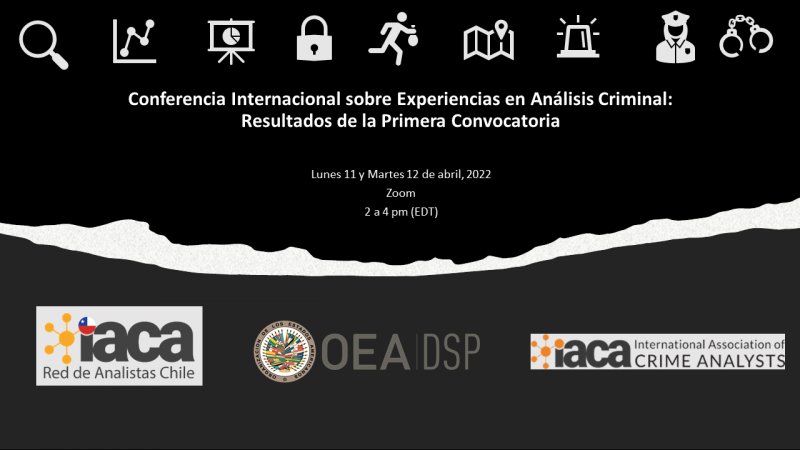 1ra Conferencia Internacional (2022) | 1st International Conference (2022)
1ra Conferencia Internacional (2022) | 1st International Conference (2022)
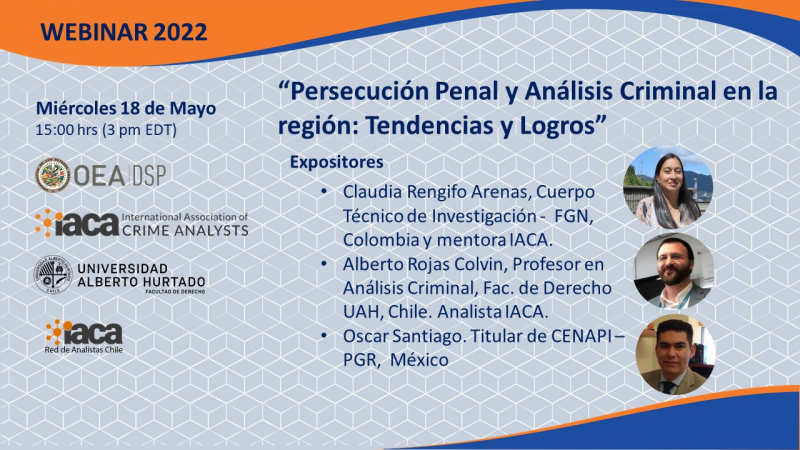 (2022) 1er Conversatorio: Persecución Penal y Análisis Criminal
(2022) 1er Conversatorio: Persecución Penal y Análisis Criminal
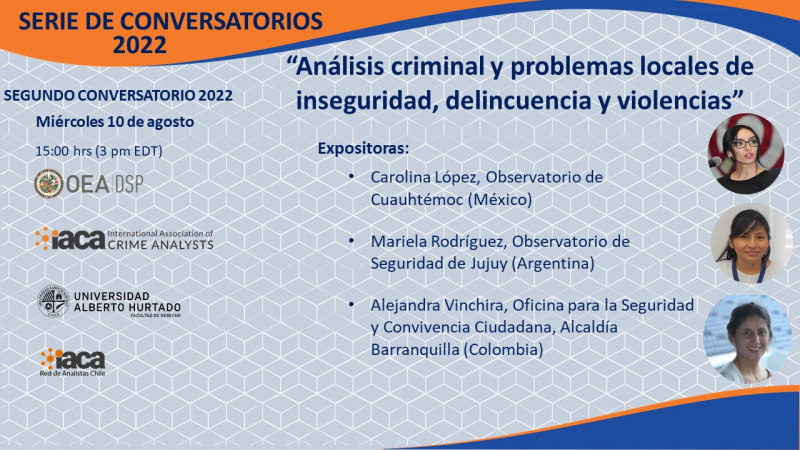 (2022) 2do Conversatorio: Prevención a Nivel Municipal y análisis Criminal
(2022) 2do Conversatorio: Prevención a Nivel Municipal y análisis Criminal
Podcasts

Podcast for those looking to learn about crime analysis and evidence-based policing from those within the community.
Created by Nicholas Roy.

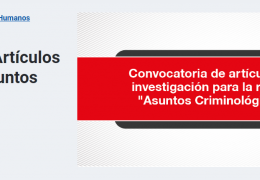
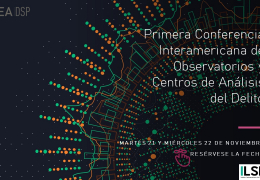
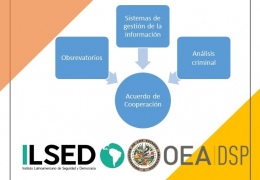

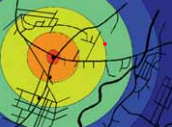
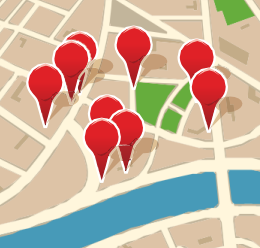
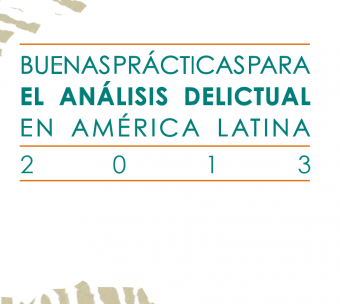

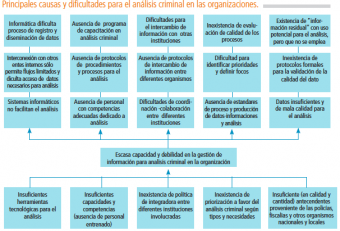
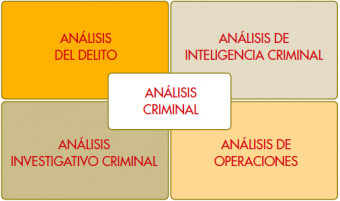
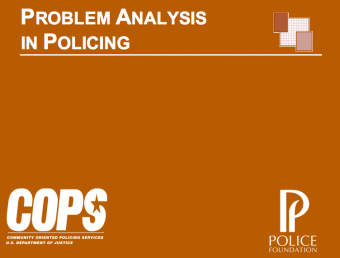
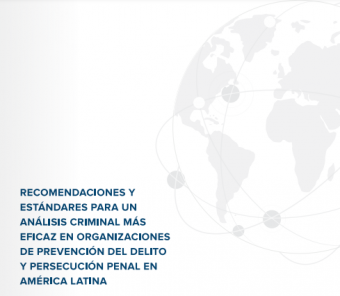
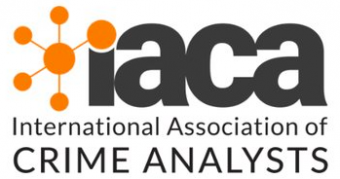

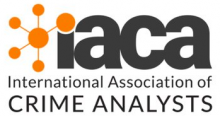

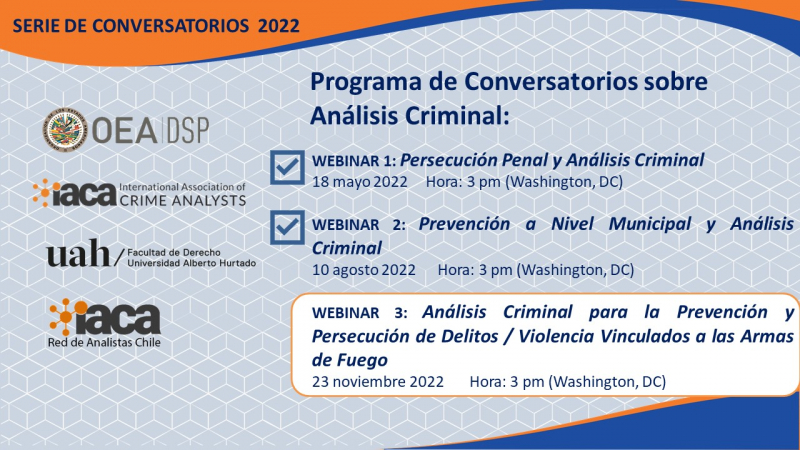
Muro | Wall